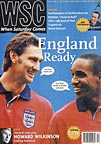 Friday 1 Dennis Wise, Frank Lampard, Steve Guppy and Trevor Sinclair are the new names in Little Kev's squad to play Belgium. Paul Ince is recalled in place of David Batty, making sure the squad contains no less than the mandatory three players who have been sent off for England in the past 18 months. Newcastle sign Kevin Gallacher from Blackburn for £700,000. A consortium of Icelandic businessmen has made a bid of £6 million to buy Stoke City, hoping to install the national team coach Gudjon Thordarsson as manager in place of the luckless Gary Megson.
Friday 1 Dennis Wise, Frank Lampard, Steve Guppy and Trevor Sinclair are the new names in Little Kev's squad to play Belgium. Paul Ince is recalled in place of David Batty, making sure the squad contains no less than the mandatory three players who have been sent off for England in the past 18 months. Newcastle sign Kevin Gallacher from Blackburn for £700,000. A consortium of Icelandic businessmen has made a bid of £6 million to buy Stoke City, hoping to install the national team coach Gudjon Thordarsson as manager in place of the luckless Gary Megson.
Saturday 2 Strugglers' Saturday sees Steve Staunton scandalously sent off in Villa's dismal 0-0 with Liverpool, a game mystifyingly described as "just balloons on sticks" by John Gregory. Bottom club Sheff Wed go goal-crazy against Wimbledon, winning 5-1 in front of a suitably Wimbledon-sized crowd, 18,077. Sunderland are second after pasting Bradford 4-0 at Valley Parade. Everton are reportedly the target of a £50 million bid from Chris Evans and Terry Venables – possibly both in the top two on any fans' list of undesirable owners. India's Baichung Bhutia makes his debut as a sub for Bury, and gets booked after two minutes. "We will probably get more fans than if we'd signed Ronaldo," Bury manager Neil Warnock had predicted. They get 3,603.
Read more…
 The Euro 2000 play-off draw has pitted the two oldest foes in Football against each other, but does anyone outside of Britain care?
The Euro 2000 play-off draw has pitted the two oldest foes in Football against each other, but does anyone outside of Britain care?